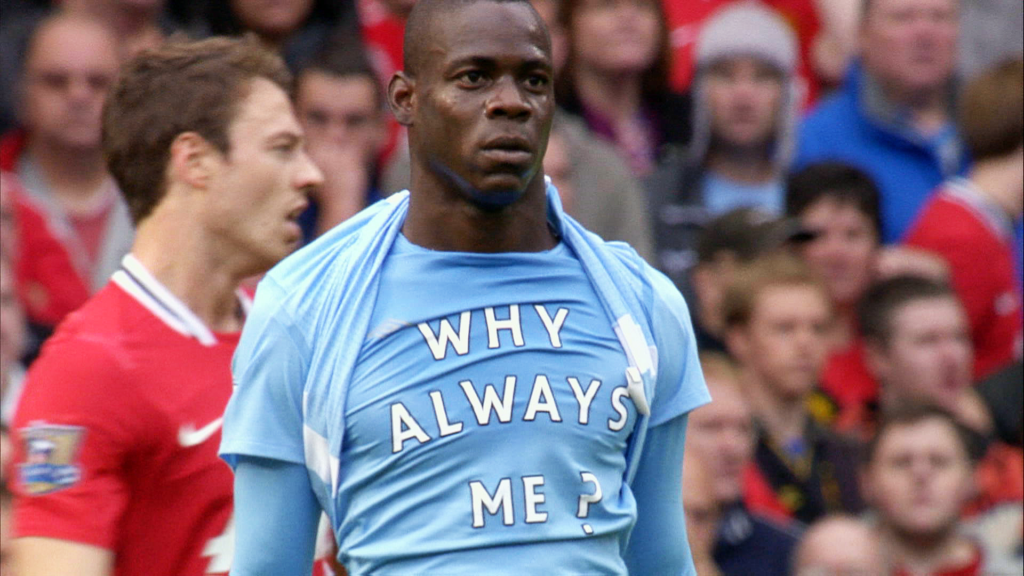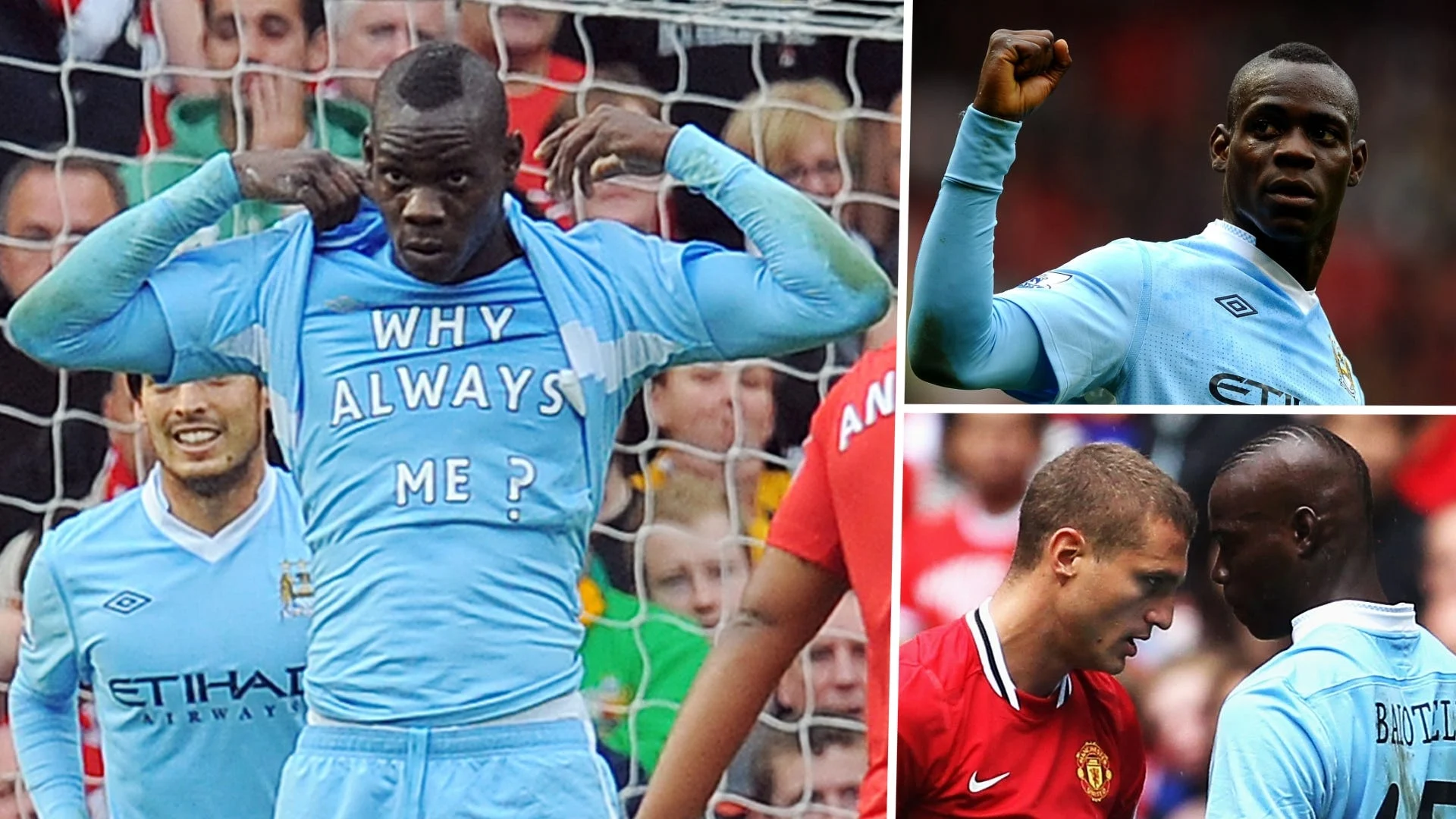The phrase “Why Always Me?” has transcended its origins as a football celebration to become a ubiquitous meme across the internet. This seemingly simple question encapsulates a universal sentiment of frustration, exasperation, and a touch of self-deprecating humor.
The Origins: A Footballing Iconoclast
The phrase gained notoriety in 2012 when Mario Balotelli, then a Manchester City striker, celebrated scoring against Manchester United by revealing a t-shirt emblazoned with the words “Why Always Me?” during the Manchester derby.1 This audacious act, a blend of arrogance and self-awareness, instantly captivated the football world.
Balotelli, known for his unpredictable and often controversial behavior, perfectly embodied the “Why Always Me?” attitude. His actions, both on and off the field, frequently defied expectations and often landed him in hot water. The phrase resonated with fans, not just for its audacity but also for its reflection of Balotelli’s unique personality.
The Meme’s Evolution
The “Why Always Me?” meme quickly transcended the realm of football. Its simplicity and relatability allowed it to resonate with a wide audience. The phrase began appearing in various contexts:
Everyday Frustrations: From minor inconveniences like spilling coffee to major setbacks, people started using “Why Always Me?
Online Humor: The meme found a natural home on the internet, where it was quickly adapted and shared across various platforms. Images, GIFs, and videos featuring the phrase became commonplace, often accompanied by humorous captions and relatable scenarios.
Cultural Phenomenon: The meme’s popularity soared, appearing in various forms of media, from television shows and movies to music videos and advertisements. It became a cultural touchstone, recognized and understood by people across different demographics.
Why the Meme Resonates
The enduring popularity of the “Why Always Me?” meme can be attributed to several factors:
Relatability: The sentiment of feeling singled out by misfortune is a universal human experience.
Humor: The self-deprecating nature of the phrase makes it a humorous way to acknowledge and cope with setbacks.
Versatility: The meme’s adaptability allows it to be applied to a wide range of situations, making it relevant and engaging to a diverse audience.
Cultural Impact: The phrase has become a part of popular culture, referenced in various forms of media and recognized by people across different generations.

The “Why Always Me?” Meme Today
While the initial fervor may have subsided, the “Why Always Me?” meme continues to be referenced and repurposed in various forms. It remains a testament to the power of a simple phrase to capture a universal sentiment and become a cultural phenomenon.
The meme serves as a reminder that even in the face of adversity, a touch of humor can help us cope and maintain a sense of perspective. It also highlights the enduring power of internet culture to create and spread memes that resonate with millions around the world.
The Meme’s Evolution and Impact
From Football to Everyday Life: The meme rapidly transcended its football origins. People began using it to express frustration with everyday mishaps: spilling coffee, missing the bus, encountering unexpected rain – the list goes on. It became a relatable way to voice annoyance at life’s minor inconveniences.
Online Dominance: The internet provided fertile ground for the meme’s proliferation. Images, GIFs, and videos featuring the phrase exploded across platforms like Twitter, Facebook, and Reddit. Users creatively adapted it to suit various situations, from work woes to dating disasters.
Cultural Impact: The meme’s influence extended beyond online spaces. It started appearing in television shows, movies, music videos, and even advertisements. This widespread adoption solidified its place as a cultural phenomenon, recognized and understood by a broad spectrum of people.
The Psychological Underpinnings
Sense of Control: The meme taps into a fundamental human desire for control. When things go wrong, it’s natural to feel powerless and question why it always seems to happen to us.
Humor as Coping Mechanism: Humor often serves as a defense mechanism. By turning frustrating situations into jokes, we can distance ourselves from the negative emotions and gain a sense of perspective. The “Why Always Me?” meme allows us to do just that, finding humor in the absurdity of our misfortunes.
Shared Experience: Recognizing that others share similar frustrations creates a sense of community. The meme fosters a shared understanding of the human condition, reminding us that we’re not alone in our struggles.
The Meme’s Impact on Language and Communication
Entering Common Lexicon: The phrase “Why Always Me? It’s now a recognizable and widely understood expression used in everyday conversations.
Shortened Forms and Variations: The meme has spawned variations and shortened forms, such as “WAM” or simply “Why me?” showcasing its adaptability and impact on our language.
Influence on Online Communication: The meme has contributed to the evolution of online communication, shaping how we express frustration, share relatable experiences, and connect with others through humor.
Further Exploration
The Impact of Social Media: Explore how social media platforms like Twitter, Facebook, and Instagram have contributed to the spread and evolution of the “Why Always Me?” meme.
Cultural Variations: Analyze how the meme has been adapted and interpreted in different cultures and languages.
The Legacy of Mario Balotelli: Examine how Balotelli’s career and personality have influenced the perception and interpretation of the “Why Always Me?” meme.
FAQs
Why has this seemingly simple phrase resonated so deeply with people worldwide?
The “Why Always Me?” meme’s enduring popularity stems from its uncanny ability to tap into a universal human experience. The feeling of being singled out by misfortune, of constantly encountering setbacks, resonates with people from all walks of life. The meme provides a humorous and relatable way to acknowledge these frustrations, offering a sense of shared experience and a collective sigh of exasperation.
What are the psychological underpinnings of this seemingly simple meme?
The “Why Always Me?” meme taps into several fundamental psychological concepts. It reflects the human desire for control, acknowledging the frustration of feeling powerless in the face of repeated setbacks. Humor serves as a powerful defense mechanism, allowing us to distance ourselves from negative emotions and gain a sense of perspective. By turning frustrating situations into jokes, we can cope with adversity and maintain a sense of control, even in the face of seemingly uncontrollable circumstances.
To read more, Click Here




Leave a Reply